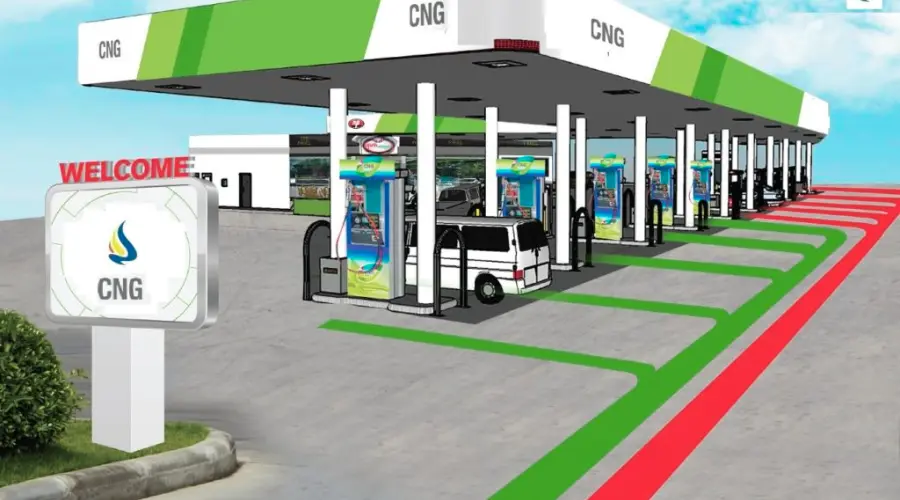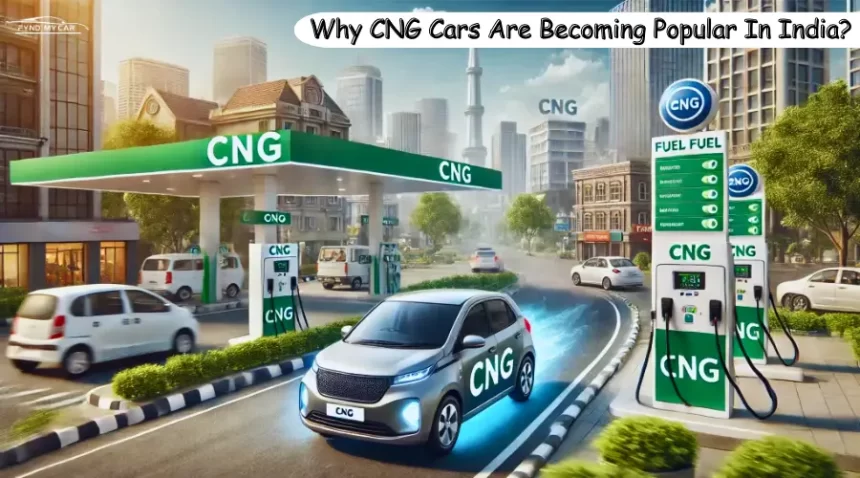Wondering why CNG cars are becoming popular in India over petrol or diesel options? Growing environmental awareness, rising fuel prices, and government incentives supporting cleaner energy options have all contributed to this shifting priorities.
Additionally, in crowded urban areas, CNG cars provide an economical and sustainable option for daily commuting. Given India’s growing population and poor air quality, many people believe that CNG is a workable solution to both environmental and economic issues.
To get the complete details regarding this subject, make sure you read this article thoroughly to the end.
Why CNG Cars Are Becoming Popular In India? 7 Major Reasons
In India, the popularity of CNG vehicles is rising really fast, and there are good reasons for this preference change. CNG vehicles are becoming an ideal substitute for petrol and diesel vehicles due to growing fuel prices, environmental concerns, and technological advancements. The following are the seven main causes of the increasing popularity of CNG vehicles in the nation:
1. Cost-Effective Fuel Option
The affordability of CNG as a fuel is one of the main factors promoting demand for CNG vehicles. A CNG car is a great option for daily commuting because its per-kilometer running costs are significantly lower than those of petrol and diesel. Due to the present spike in fuel prices in India, many middle-class families and owners of commercial vehicles believe that CNG is ultimately a more cost-effective option.
2. Environmentally Friendly
India has serious issues with air pollution, particularly in its large cities. Compared to petrol or diesel, CNG is known to burn much cleaner, emitting notably less carbon monoxide, carbon dioxide, hydrocarbons, and nitrogen oxides. Due to this, CNG vehicles are a sustainable choice for people who are concerned about their carbon footprint. Many consumers choose CNG vehicles as a greener option as a result of growing awareness of climate change and environmental preservation.
3. Government Support and Incentives
The use of CNG vehicles is strongly promoted by the Indian government to lower pollution levels and reduce dependency on imported crude oil. Vehicle owners who use CNG are eligible for several tax breaks, subsidies, and incentives. Additionally, some cities give CNG cars special licenses and access to the roads, which increases their appeal to both private and business drivers.
4. Lower Maintenance Costs
Compared to petrol or diesel, compressed natural gas (CNG) is a cleaner fuel that leaves behind less residue. Through this, CNG vehicles’ engine parts endure less wear and tear, which lowers maintenance and servicing expenses. For Indian consumers who are concerned about costs, this is a big focus as lower maintenance costs result in more long-term savings.

5. Expanding CNG Infrastructure
The lack of refuelling stations used to be a major drawback of owning a CNG vehicle. However, things are very different now. The country’s CNG network is being expanded with significant funding from the public and private sectors, particularly in major cities and on highways. The accessibility issue has been resolved by the increasing availability of CNG pumps, which has increased consumer confidence in making the switch to CNG vehicles.
6. Technological Advancements
The CNG vehicles of today are far more advanced than those of the past. New technologies have been included by automakers to guarantee improved engine performance, increased safety features, and fuel efficiency. Additionally, dual-fuel (petrol and CNG) systems offer drivers flexibility by enabling them to switch between fuels as needed, which increases convenience.
7. Rising Petrol and Diesel Prices
The ongoing increase in the cost of petrol and diesel is one of the primary factors leading to the growing popularity of CNG vehicles in India. These fuel prices have been unpredictable and constantly rising over the last few years, which has a direct impact on car owners’ monthly budgets, particularly for those who drive frequently or long distances. In contrast, the cost of CNG has stayed relatively stable when compared to that of petrol and diesel. Due to this price stability, drivers can save a substantial amount of money on fuel over time, making CNG cars a more cost-effective choice for frequent use.
CNG Vs Petrol Vs EV: Which One Is Better?

- Fuel and Running Cost: Since CNG is less expensive than petrol or diesel, it is a very cost-effective vehicle for daily commuting. Compared to petrol cars, which have the highest fuel costs of the three, CNG vehicles have significantly lower operating costs. Since electricity is less expensive than both petrol and compressed natural gas (CNG), electric vehicles (EVs) have the lowest operating costs; however, EVs are typically more expensive to buy.
- Environmental Impact: Since EVs have no tailpipe emissions, they are the most environmentally friendly option for lowering carbon emissions and air pollution. With lower emissions of carbon monoxide, nitrogen oxides, and particulate matter, CNG cars are more environmentally friendly than petrol-powered models. Petrol vehicles are the least sustainable choice because they produce the most greenhouse gas emissions and air pollution.
- Performance and Driving Range: In terms of power, acceleration, and the ease of long-distance driving, petrol-powered cars typically perform better. Although CNG cars perform well in cities, they can lose power, particularly when travelling on highways or carrying heavy loads. EVs offer smooth driving and instant torque, but for lengthy trips, range anxiety and a lack of public charging stations continue to be issues.
- Maintenance and Durability: As EVs don’t have engines, gearboxes, or a lot of moving parts, they require less maintenance and can be serviced more frequently. Since CNG burns cleaner and wears down engines less than petrol, CNG cars also require less maintenance than petrol-powered models. Fuel-powered vehicles require routine maintenance and are more likely to produce carbon emissions.
- Infrastructure and Availability: India has a large number of petrol stations, which guarantee convenience. Although it is expanding, some areas still lack adequate CNG infrastructure. Long-distance travel is difficult for EV owners because there are still few EV charging stations outside of major cities, despite their expansion.
Who Is Leading The CNG Charge?
Several car manufacturers are actively involved in the CNG market:
- Maruti Suzuki: In India, Maruti Suzuki has the largest selection of CNG vehicles. Popular vehicles like the Alto, S-Presso, Swift, Brezza, Dzire, Baleno, Fronx, Waggon R, Celerio, Eeco, Ertiga, XL6, and Grand Vitara are part of their CNG lineup.
- Tata Motors: Tata has also made a significant move into the CNG market. CNG is an option for the majority of their well-known models, including the Tiago, Punch, Altroz, Tigor, and Nexon. Even their upcoming Curvv SUV is being tested on compressed natural gas.
- Hyundai: The Grand i10 Nios, Aura, and Creta are available with CNG, though Hyundai offers fewer CNG models than Maruti Suzuki and Tata.
Summing Up
In India, CNG vehicles are growing in recognition because they strike the ideal mix between affordability, environmental friendliness, and usefulness. For everyday commuters, this fuel provides a dependable, affordable option because fuel prices are still high, and infrastructure for electric vehicles is still growing. Advances in CNG vehicle technology, government incentives, and the expansion of Compressed Natural Gas refueling stations have all contributed to this change. Before the ultimate broad use of fully electric vehicles, CNG cars stand out as the perfect middle option as consumer awareness of air pollution and sustainability increases.
FAQ
1. Are CNG cars cheaper to run than petrol cars?
A. Yes, CNG cars have a much lower running cost compared to petrol cars, making them economical for daily use.
2. Is CNG safe for vehicles?
A. Modern CNG vehicles are designed with advanced safety features like leak-proof cylinders and automatic shut-off valves, making them safe for everyday use.
3. Does CNG affect vehicle performance?
A. While CNG cars may offer slightly less power than petrol cars, they are perfectly suited for city commuting and light driving needs.
4. Is CNG infrastructure available everywhere in India?
A. CNG stations are rapidly increasing, especially in urban areas, though rural availability is still limited.
5. Are CNG cars environmentally friendly?
A. Yes, CNG cars produce lower harmful emissions than petrol or diesel vehicles, making them eco-friendly.







